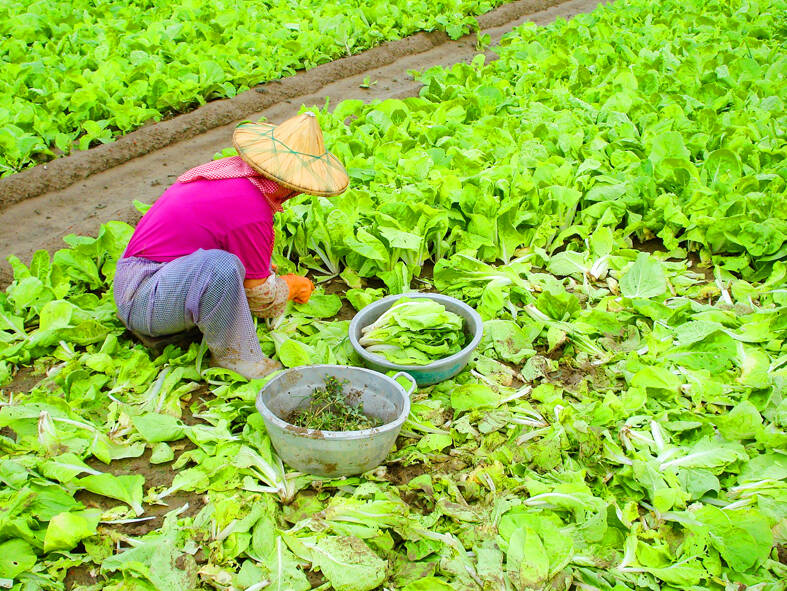The government has 143 food distribution stations around the nation and supply chains that are “fully planned” in the event of an emergency such as an invasion by China, Minister of Agriculture Chen Junne-jih (陳駿季) said on Wednesday.
Chen also during a legislative hearing said that Taiwan “currently has five-and-a-half months of public grain reserves” which could increase to “about eight or nine months if [this year’s] harvest is good.”
The state-run reserves “usually last from eight to 12 months,” but Taiwan also has private grain reserves, which means at present the nation’s food needs could be met for a year, he said.

Photo: Yeh Yung-chien, Taipei Times
The distribution process is a collaboration between central and local governments, although the central government “would not directly” handle food distribution in a national emergency, Chen added.
While there are 143 stations, not every county or city requires one, since food distribution plans are not based on those administrative divisions, Chen said.
The Ministry of Agriculture (MOA) would provide more detailed information on food distribution plans as part of ongoing preparations for emergency scenarios, including war and natural disasters, he said.
The minister was responding to concerns raised by Chinese Nationalist Party (KMT) Legislator Weng Hsiao-ling (翁曉玲), who cited a report from the Center for Strategic and International Studies on Taiwan’s food security.
The US think tank report said that a Chinese blockade could “at any time” prevent ships from reaching Taiwan, which imports 70 percent of its food and 96 percent of its energy, Weng said.
On Oct. 14 last year, for instance, the China’s military conducted large-scale drills around Taiwan that, according to the Chinese People’s Liberation Army, focused on capabilities including “the blockade and control of key ports and areas.”

The High Prosecutors’ Office yesterday withdrew an appeal against the acquittal of a former bank manager 22 years after his death, marking Taiwan’s first instance of prosecutors rendering posthumous justice to a wrongfully convicted defendant. Chu Ching-en (諸慶恩) — formerly a manager at the Taipei branch of BNP Paribas — was in 1999 accused by Weng Mao-chung (翁茂鍾), then-president of Chia Her Industrial Co, of forging a request for a fixed deposit of US$10 million by I-Hwa Industrial Co, a subsidiary of Chia Her, which was used as collateral. Chu was ruled not guilty in the first trial, but was found guilty

DEADLOCK: As the commission is unable to forum a quorum to review license renewal applications, the channel operators are not at fault and can air past their license date The National Communications Commission (NCC) yesterday said that the Public Television Service (PTS) and 36 other television and radio broadcasters could continue airing, despite the commission’s inability to meet a quorum to review their license renewal applications. The licenses of PTS and the other channels are set to expire between this month and June. The National Communications Commission Organization Act (國家通訊傳播委員會組織法) stipulates that the commission must meet the mandated quorum of four to hold a valid meeting. The seven-member commission currently has only three commissioners. “We have informed the channel operators of the progress we have made in reviewing their license renewal applications, and

‘DENIAL DEFENSE’: The US would increase its military presence with uncrewed ships, and submarines, while boosting defense in the Indo-Pacific, a Pete Hegseth memo said The US is reorienting its military strategy to focus primarily on deterring a potential Chinese invasion of Taiwan, a memo signed by US Secretary of Defense Pete Hegseth showed. The memo also called on Taiwan to increase its defense spending. The document, known as the “Interim National Defense Strategic Guidance,” was distributed this month and detailed the national defense plans of US President Donald Trump’s administration, an article in the Washington Post said on Saturday. It outlines how the US can prepare for a potential war with China and defend itself from threats in the “near abroad,” including Greenland and the Panama

A wild live dugong was found in Taiwan for the first time in 88 years, after it was accidentally caught by a fisher’s net on Tuesday in Yilan County’s Fenniaolin (粉鳥林). This is the first sighting of the species in Taiwan since 1937, having already been considered “extinct” in the country and considered as “vulnerable” by the International Union for Conservation of Nature. A fisher surnamed Chen (陳) went to Fenniaolin to collect the fish in his netting, but instead caught a 3m long, 500kg dugong. The fisher released the animal back into the wild, not realizing it was an endangered species at